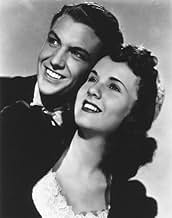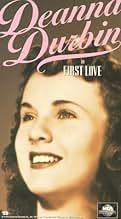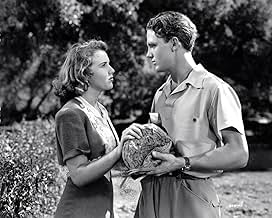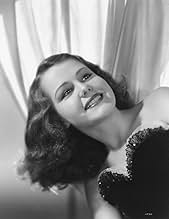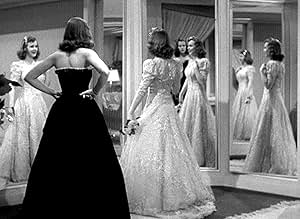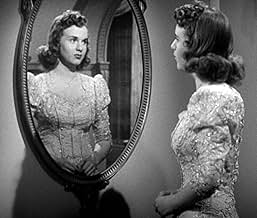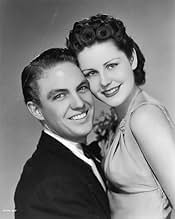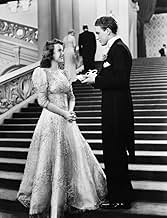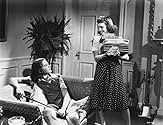Ajouter une intrigue dans votre langueAn orphaned boarding school graduate secretly attends a prestigious ball, where she falls for the boyfriend of her snobbish cousin.An orphaned boarding school graduate secretly attends a prestigious ball, where she falls for the boyfriend of her snobbish cousin.An orphaned boarding school graduate secretly attends a prestigious ball, where she falls for the boyfriend of her snobbish cousin.
- Nommé pour 2 oscars
- 4 victoires et 2 nominations au total
Avis en vedette
FIRST LOVE (Universal, 1939), directed by Henry Koster, stars Deanna Durbin in one of her ever popular movie roles. Basically a retelling of the old "Cinderella" story set in contemporary New York City, the youthful Durbin, making her sixth screen appearance, and Robert Stack, in movie debut, are supported by fine movie veterans, namely gravel voice Eugene Palette, Leatrice Joy (former lead actress of the silent screen), and Kathleen Howard in a small but important role as the crusty but wise old-maid school teacher with a heart of gold. Aside from her previous works opposite W.C. Fields in three classic comedies of the mid 1930s, this is one of the few times where Howard's talent as a true character actress is fully realized. And now back to Durbin's FIRST LOVE.
The plot begins at a high school graduation with the gathering of classmates receiving their diplomas, one being Constance "Connie" Harding (Deanna Durbin). With her parents dead and no relative in attendance, Connie is invited to spend the summer with her closest friend, Marcia (Marcia Mae Jones), but in good faith for all the financial support awarded her, she decides to stay with her uncle, James F. Clinton (Eugene Palette), a business tycoon, and his family. Afraid to face the challenge that awaits her, it is Miss Wiggens (Kathleen Howard), her former teacher, who encourages to move on, bringing hope and happiness to those around her. Although Connie does win over her uncle's servants, she's made to feel like an outsider by his wife, Grace (Leatrice Joy), spending much time studying astrology; Walter (Lewis Howard), their lazy son who'd rather be served than working; and Barbara (Helen Parrish), the stuck-up daughter who delights in giving orders and not taking them. Very much interested in high society's Ted Drake (Robert Stack), Barbara makes every effort keeping Connie away from him. Though invited to attend the ball with her mother and brother, and hope of meeting Ted again, Barbara purposely arranges for Connie to remain at home to entertain a visiting uncle from Washington during their absence. Feeling pity towards the disappointed Connie, the servants arrange having the family chauffeur (Jack Mulhall) purposely detain the Clintons by getting arrested while giving the opportunity for Connie to attend with the understanding she'd have to leave by midnight. After a grand evening with Ted, Connie, nearly forgetting the time, makes a hasty departure the very moment the Clintons arrive, leaving behind her one slipper found by Ted. When Barbara finds that Connie did attend the ball, their confrontation forces Connie to leave, causing Clinton, who cares for Connie, to become deeply ashamed for what his family has done.
In traditional thirties films depicting rich families, the Clintons in FIRST LOVE could very well be that of the Bullocks from the 1936 Universal comedy, MY MAN GODFREY, starring William Powell and Carole Lombard, each casting Eugene Palette as the millionaire with family he would rather forget. Instead of casting Alice Brady as the scatterbrained wife, Leatrice Joy is given the assignment, as did Lewis Howard's good-for-nothing son over Mischa Auer's freeloading protégé. There's no butler named Godfrey this time around, but good natured servants enacted by lesser known actors as Mary Treen (Agnes, the maid); Dorothy Vaughn (Ollie, the maid); Lucille Ward (The Cook); and Charles Coleman (George, the Butler). Other familiar faces as Frank Jenks (a Policeman and friend of the family servants); Samuel S. Hinds, Thurston Hall and Doris Lloyd fill in the void in lesser roles while Durbin highlights with her grand singing of "There's No Place Like Home," "Amapola." "Spring in My Heart" (by Johann Strauss) and "Un Bel Di" (One Fine Day) from Giacomo Puccini's "Madame Butterfly." Regardless of its title and Durbin's then publicized first screen kiss, FIRST LOVE is far from being trite formula. In fact, it's one of her and the studio's top productions of the year. Not having to resort to storybook fashion of "Cinderella," FIRST LOVE simply modernizes an old fairy tale, resulting to something quite original thanks to the fine screenplay, and natural, low-key performances by Durbin and Palette. Palette's great moment comes when he finally lets out steam telling off his selfish family, while Durbin adds humor during the ball by unwittingly stepping onto the platform in the place originally intended for another guest singer (Grace Hayle). There's also a touch of creativity in movie making in the ballroom sequence where all the guests virtually disappear in Connie's mind (and viewers) while dancing and conversing with Ted, and reappearing the very moment Connie returns to reality.
In spite of Durbin and her movies being the box office attractions at the time, presently appears to be of minor importance. Due to lack of television broadcasts since the 1980s, the time when FIRST LOVE had some exposure on public television, along with home video distribution in 1996, the Durbin products appear to be less popular due to its sugar sweet reputation. Having Durbin movies on DVD packages labeled "The Sweetheart Package" doesn't help matters either, yet looking back at these particular films whenever possible shows the entertaining values and certain star quality that has delighted audiences in an era so different from what's presented today. (***1/2)
The plot begins at a high school graduation with the gathering of classmates receiving their diplomas, one being Constance "Connie" Harding (Deanna Durbin). With her parents dead and no relative in attendance, Connie is invited to spend the summer with her closest friend, Marcia (Marcia Mae Jones), but in good faith for all the financial support awarded her, she decides to stay with her uncle, James F. Clinton (Eugene Palette), a business tycoon, and his family. Afraid to face the challenge that awaits her, it is Miss Wiggens (Kathleen Howard), her former teacher, who encourages to move on, bringing hope and happiness to those around her. Although Connie does win over her uncle's servants, she's made to feel like an outsider by his wife, Grace (Leatrice Joy), spending much time studying astrology; Walter (Lewis Howard), their lazy son who'd rather be served than working; and Barbara (Helen Parrish), the stuck-up daughter who delights in giving orders and not taking them. Very much interested in high society's Ted Drake (Robert Stack), Barbara makes every effort keeping Connie away from him. Though invited to attend the ball with her mother and brother, and hope of meeting Ted again, Barbara purposely arranges for Connie to remain at home to entertain a visiting uncle from Washington during their absence. Feeling pity towards the disappointed Connie, the servants arrange having the family chauffeur (Jack Mulhall) purposely detain the Clintons by getting arrested while giving the opportunity for Connie to attend with the understanding she'd have to leave by midnight. After a grand evening with Ted, Connie, nearly forgetting the time, makes a hasty departure the very moment the Clintons arrive, leaving behind her one slipper found by Ted. When Barbara finds that Connie did attend the ball, their confrontation forces Connie to leave, causing Clinton, who cares for Connie, to become deeply ashamed for what his family has done.
In traditional thirties films depicting rich families, the Clintons in FIRST LOVE could very well be that of the Bullocks from the 1936 Universal comedy, MY MAN GODFREY, starring William Powell and Carole Lombard, each casting Eugene Palette as the millionaire with family he would rather forget. Instead of casting Alice Brady as the scatterbrained wife, Leatrice Joy is given the assignment, as did Lewis Howard's good-for-nothing son over Mischa Auer's freeloading protégé. There's no butler named Godfrey this time around, but good natured servants enacted by lesser known actors as Mary Treen (Agnes, the maid); Dorothy Vaughn (Ollie, the maid); Lucille Ward (The Cook); and Charles Coleman (George, the Butler). Other familiar faces as Frank Jenks (a Policeman and friend of the family servants); Samuel S. Hinds, Thurston Hall and Doris Lloyd fill in the void in lesser roles while Durbin highlights with her grand singing of "There's No Place Like Home," "Amapola." "Spring in My Heart" (by Johann Strauss) and "Un Bel Di" (One Fine Day) from Giacomo Puccini's "Madame Butterfly." Regardless of its title and Durbin's then publicized first screen kiss, FIRST LOVE is far from being trite formula. In fact, it's one of her and the studio's top productions of the year. Not having to resort to storybook fashion of "Cinderella," FIRST LOVE simply modernizes an old fairy tale, resulting to something quite original thanks to the fine screenplay, and natural, low-key performances by Durbin and Palette. Palette's great moment comes when he finally lets out steam telling off his selfish family, while Durbin adds humor during the ball by unwittingly stepping onto the platform in the place originally intended for another guest singer (Grace Hayle). There's also a touch of creativity in movie making in the ballroom sequence where all the guests virtually disappear in Connie's mind (and viewers) while dancing and conversing with Ted, and reappearing the very moment Connie returns to reality.
In spite of Durbin and her movies being the box office attractions at the time, presently appears to be of minor importance. Due to lack of television broadcasts since the 1980s, the time when FIRST LOVE had some exposure on public television, along with home video distribution in 1996, the Durbin products appear to be less popular due to its sugar sweet reputation. Having Durbin movies on DVD packages labeled "The Sweetheart Package" doesn't help matters either, yet looking back at these particular films whenever possible shows the entertaining values and certain star quality that has delighted audiences in an era so different from what's presented today. (***1/2)
Young Deanna Durbin goes to live with her uncle Eugene Palette and a group of snooty society cousins in this film. They treat her like a country cousin and snub her generally including her aunt by marriage. But little do they know that Deanna is destined to find her First Love in this story reworked from the Cinderella fairy tale.
After three years Deanna was growing up on screen and the folks at Universal Pictures decided she ought to have her first screen kiss. The one tapped for the honor was a guy making his screen debut Robert Stack.
The one who really treats her rotten is her débutante cousin Helen Parrish and her equally snobby friend June Storey. Deanna is not treated any better than one of the staff at her house, like Cinderella she might as well be relegated to being a chimney sweep.
Stack is the guy that Parrish and Storey have set their caps for, he's another society kid. But he likes simple and unaffected Deanna who ironically Parrish sets up the meeting between them. That's a rather funny scene.
Some good songs for Durbin highlighted the classic There's No Place Like Home, Amapola, and Un Bel Di from Madame Butterfly. And of course one of the most publicized kisses ever in screen history.
First Love brought home Oscar nominations for Sound, Art&Set Decoration, and Musical Scoring for Universal Pictures. Little Miss Fix-It was definitely growing up and her future roles would show a maturing Durbin for the movie-going public. It still is fine entertainment.
After three years Deanna was growing up on screen and the folks at Universal Pictures decided she ought to have her first screen kiss. The one tapped for the honor was a guy making his screen debut Robert Stack.
The one who really treats her rotten is her débutante cousin Helen Parrish and her equally snobby friend June Storey. Deanna is not treated any better than one of the staff at her house, like Cinderella she might as well be relegated to being a chimney sweep.
Stack is the guy that Parrish and Storey have set their caps for, he's another society kid. But he likes simple and unaffected Deanna who ironically Parrish sets up the meeting between them. That's a rather funny scene.
Some good songs for Durbin highlighted the classic There's No Place Like Home, Amapola, and Un Bel Di from Madame Butterfly. And of course one of the most publicized kisses ever in screen history.
First Love brought home Oscar nominations for Sound, Art&Set Decoration, and Musical Scoring for Universal Pictures. Little Miss Fix-It was definitely growing up and her future roles would show a maturing Durbin for the movie-going public. It still is fine entertainment.
Deanna Durbin is the poor cousin of a rich family. She attends Kathleen Howard's girl's school with cousin Helen Parish, and gets invited to their New York mansion for Christmas break. Even though uncle Eugene Pallette seems nice enough -- what little is seen of him -- the rest of the family is a bunch of weirdos and nasties. She wants to go to the ball, but has to wear cast-off clothes. But the mansion's staff, who adore her for singing for them, club together and rent an expensive outfit. When Miss Parish orders her not to go to the ball....
Miss Durbin was Universal's biggest star, but how were they to deal with the fact that she was now 17 and could no longer be Little Miss Fix-It? Her production team, consisting of Henry Koster and Joe Pasternak decided to write her a Cinderella story, with newly-hired Robert Stack as Prince Charming. Of course there are musical interludes, an old-fashioned ballad or two, and a selection of opera arias. The writing team kept everything familiar, including borrowing liberally from My Man Godfrey to make sure that Miss Durbin's fans wouldn't be too outraged.
Miss Durbin was Universal's biggest star, but how were they to deal with the fact that she was now 17 and could no longer be Little Miss Fix-It? Her production team, consisting of Henry Koster and Joe Pasternak decided to write her a Cinderella story, with newly-hired Robert Stack as Prince Charming. Of course there are musical interludes, an old-fashioned ballad or two, and a selection of opera arias. The writing team kept everything familiar, including borrowing liberally from My Man Godfrey to make sure that Miss Durbin's fans wouldn't be too outraged.
Two very young actors make up this cinderella story, Robert Stack (just 20) is the hero and Deanna at 18 still has quite a bit of puppy fat on her face (I didn't like the hair style - was it to make her seem older? ). She, an Orphan like Cinderella lands up in - not step mother here, but rich maternal uncle's home. Here of course there was one cousin, of the step-sister type the other cousin of opposite gender, the aunt and even the uncle are really not villainish by nature, but villain by the lack of empathy, not only towards our Cinderella, but towards the whole world.
There are of course nice songs too, has to be when Deanna is there. The movie is well made, and very watch-able, and of course the end is predictable in any fairy tale. Along with Deanna there are two more lovely girls, Helen Parish (the Cousin), a quite frequent co-actor of Deanna, and June Storey, another Canadian, both trying to win the Prince Charming.
There are two interesting things here, one puzzled me, till I understood what it was and other one, the main song, wasn't properly visualised.
If there is a call to sing a Strauss' waltz, even if you specify it is the Junior's, unless you know which one it is, no one can sing it. More so, it had been told to have a bit of modifications, some bars were changed, probably to cater to her voice-spectrum by the singer, Mme Cottellini, who was supposed to sing it, mentioned. Even more problem in it was, that even had she caught the opening, she still would have been in for a trouble, since it was a mix of three of Strauss' Waltzs, Schatz-Walzer, the beautiful Rosen aus dem Süden(the main body) and lagunen Walzer (finale) : unless one knows that, it would be impossible.
The interesting and wonder-ful (not necessary wonderful) portion was, after this waltz, when Deanna was dancing with Stack, I observed there was something in her left hand, what was it I wondered.... and then it struck me. That was the cloak-ticket. And she had retained it, held between the forefinger and middle finger of her hand, till she exchanged it for cloak. In fact she had been playing with it, even during the 'spring waltz'. This was unexpected that one would go for that much precision. I wonder who thought about it, Koster or Deanna ? I am sure the viewers won't have noticed it, or even wondered if it wasn't there (you could have some pocket or fold in the dress to keep it).
There are of course nice songs too, has to be when Deanna is there. The movie is well made, and very watch-able, and of course the end is predictable in any fairy tale. Along with Deanna there are two more lovely girls, Helen Parish (the Cousin), a quite frequent co-actor of Deanna, and June Storey, another Canadian, both trying to win the Prince Charming.
There are two interesting things here, one puzzled me, till I understood what it was and other one, the main song, wasn't properly visualised.
If there is a call to sing a Strauss' waltz, even if you specify it is the Junior's, unless you know which one it is, no one can sing it. More so, it had been told to have a bit of modifications, some bars were changed, probably to cater to her voice-spectrum by the singer, Mme Cottellini, who was supposed to sing it, mentioned. Even more problem in it was, that even had she caught the opening, she still would have been in for a trouble, since it was a mix of three of Strauss' Waltzs, Schatz-Walzer, the beautiful Rosen aus dem Süden(the main body) and lagunen Walzer (finale) : unless one knows that, it would be impossible.
The interesting and wonder-ful (not necessary wonderful) portion was, after this waltz, when Deanna was dancing with Stack, I observed there was something in her left hand, what was it I wondered.... and then it struck me. That was the cloak-ticket. And she had retained it, held between the forefinger and middle finger of her hand, till she exchanged it for cloak. In fact she had been playing with it, even during the 'spring waltz'. This was unexpected that one would go for that much precision. I wonder who thought about it, Koster or Deanna ? I am sure the viewers won't have noticed it, or even wondered if it wasn't there (you could have some pocket or fold in the dress to keep it).
A maturing DEANNA DURBIN and a strikingly handsome young ROBERT STACK are the enjoyable romantic leads in this Cinderella tale that spins along with a few Durbin songs tossed in for good measure.
Deanna plays the orphaned cousin of a rich and snobbish family that tries to get her to stay home from a lavish ball. With the help of servants (instead of mice), Deanna gets to attend the ball, delivers an outstanding solo, meets the handsome "prince" (Stack) and has to fend off the insults of her snobbish cousin (Helen Parrish).
The slight plot moves effortlessly toward a happy ending. Durbin fans should love this one--it's easy to take and easy to love. Eugene Pallette gives a fine comic performance as her gruff uncle and the rest of the cast does a professional job under Henry Koster's direction.
Deanna plays the orphaned cousin of a rich and snobbish family that tries to get her to stay home from a lavish ball. With the help of servants (instead of mice), Deanna gets to attend the ball, delivers an outstanding solo, meets the handsome "prince" (Stack) and has to fend off the insults of her snobbish cousin (Helen Parrish).
The slight plot moves effortlessly toward a happy ending. Durbin fans should love this one--it's easy to take and easy to love. Eugene Pallette gives a fine comic performance as her gruff uncle and the rest of the cast does a professional job under Henry Koster's direction.
Le saviez-vous
- AnecdotesDeanna Durbin's character gives her birthdate as 4 December - Durbin's own.
- GaffesThe movement of Deanna during the scene with her mirror.
- Citations
Miss Wiggins: The trouble with you young people is you don't believe in anything. You're afraid, afraid of hope, afraid of happiness.
- ConnexionsFeatured in Hers to Hold (1943)
Meilleurs choix
Connectez-vous pour évaluer et surveiller les recommandations personnalisées
- How long is First Love?Propulsé par Alexa
Détails
- Durée1 heure 24 minutes
- Couleur
- Rapport de forme
- 1.37 : 1
Contribuer à cette page
Suggérer une modification ou ajouter du contenu manquant

Lacune principale
By what name was First Love (1939) officially released in Canada in English?
Répondre
